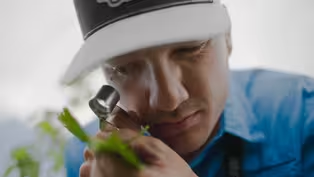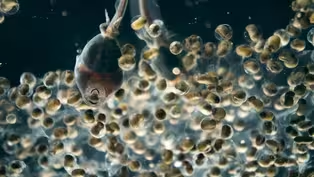
Duck Deployments and Mite Airstrikes: Nature’s Pest Patrol
Clip: Season 2 Episode 2 | 7m 18sVideo has Closed Captions
From ducks to drones, Shane explores how farmers fight pests with nature — not chemicals.
Host Shane Campbell-Staton meets the unlikely heroes of pest control—from 10,000 ducks in Thai rice fields to microscopic mites dropped by drone over Washington’s hops. Exploring the ancient roots and modern science of biocontrol, Shane reveals how farmers are teaming up with nature to protect crops — without relying on chemicals.
Problems playing video? | Closed Captioning Feedback
Problems playing video? | Closed Captioning Feedback

Duck Deployments and Mite Airstrikes: Nature’s Pest Patrol
Clip: Season 2 Episode 2 | 7m 18sVideo has Closed Captions
Host Shane Campbell-Staton meets the unlikely heroes of pest control—from 10,000 ducks in Thai rice fields to microscopic mites dropped by drone over Washington’s hops. Exploring the ancient roots and modern science of biocontrol, Shane reveals how farmers are teaming up with nature to protect crops — without relying on chemicals.
Problems playing video? | Closed Captioning Feedback
How to Watch Human Footprint
Human Footprint is available to stream on pbs.org and the free PBS App, available on iPhone, Apple TV, Android TV, Android smartphones, Amazon Fire TV, Amazon Fire Tablet, Roku, Samsung Smart TV, and Vizio.
Buy Now

Surprising Moments from Human Footprint
Do you think you know what it means to be human? In Human Footprint, Biologist Shane Campbell-Staton asks us all to think again. As he discovers, the story of our impact on the world around us is more complicated — and much more surprising — than you might realize.Providing Support for PBS.org
Learn Moreabout PBS online sponsorship(soft, tense music) (creatures chirring) (Shane) Thailand is one of the world’s top rice producers.
♪ Farmers here often harvest three crops a year.
(rice grains clatter) ♪ And after each harvest, there’s work to be done.
♪ ♪ (vehicle engine rumbling) ♪ (Shane) The rice farmers are at war with an invasive pest.
(whooshing) The golden apple snail.
(ducks quacking) And ducks love snails.
♪ How many ducks will get released here?
(grim music) ♪ (Shane) It’s about to go down.
(intense music) (ducks quacking) Oh, it’s the most adorable little army.
♪ Almost a quarter of Thailand’s 30 million domestic ducks grow up like this, trucked around the countryside to devour pests.
(distorted quacking) ♪ After a few months, they can be sold for meat or returned to the breeder to produce eggs.
♪ The ducks are one form of biological control, or "biocontrol" for short.
It’s the way we harness one species to control another.
(soft, tense music) ♪ Biologists like me have been using the word for about a hundred years.
♪ But biocontrol is much more ancient.
In fact, it didn’t even start with humans.
(mystical music) ♪ In the Serengeti, whistling acacias grow hollow thorns to attract ants, which build nests inside the thorns and defend the tree against herbivores.
(elephant whines) ♪ This is nature’s biocontrol.
The trees recruit the ants to help solve a problem.
Humans have been practicing biocontrol since at least the 4th Century, when farmers in southern China controlled pests by placing weaver ant nests into their citrus trees.
♪ Villagers would even collect wild ant nests and sell them to farmers, making this the first known commercial biocontrol.
(music distorts) Today, biocontrol is everywhere.
(soft music) But you might never notice, unless you know what you’re looking for.
♪ (Aaron) So, they’re super small.
They’re hard to see.
The trick is not to breathe and blow ’em off the plate.
(Shane) Or inhale them, I imagine.
(record scratch) (chuckles) This is Aaron Avila.
He’s got six dogs... (dogs whining, barking) ...and almost as many refrigerators to showcase his prized magnet collection.
♪ Aaron works with farmers in Washington to help solve their pest problems.
(insects chirring) -You seeing some?
-Yeah, they are much smaller than I anticipated.
(Aaron) Yep.
(fast-forward sound effect) (Shane) These tiny soldiers are western predatory mites, and they’ve got a job to do in this hop yard.
(mellow music) (Aaron) Over 70% of the nation’s hops are produced right here.
This is a national treasure -is what you’re saying... -This is, yep, yep.
(Shane) The backbone of America.
The backbone of beer drinkin’ America.
Yes, that’s right.
(Shane) Which is pretty much all of America.
(Aaron) That’s right.
(foreboding music) (Shane) One of the toughest pests in a hop yard is another mite, the two-spotted spider mite.
And the usual method of controlling them isn’t biological, it’s chemical.
(energetic music) (Aaron) Historically and still widely used today -are miticide pesticide sprays.
-(spray hissing) (Shane) But miticides aren’t working as well as they used to, because some spider mites are evolving resistance.
♪ Enter the western predatory mite, a spider mite’s worst nightmare.
The trick is delivering them where they’re needed.
(Aaron) We wanted to explore the possibility of being able to-- to do that via drone.
Okay.
And that is solely for application purposes and not because it’s really fun to fly a drone?
(laughs) (soft music) The drone pilots load the mites into a custom dispenser, set the drone to fly a pre-programmed route, and, well, bombs away.
(energetic music) ♪ If everything goes as planned, the predatory mites will get the spider mites under control... (whooshing) ...and we can all raise a glass to our little eight-legged sidekicks.
(record scratching) -Cheers, friend.
-Cheers.
(mellow music) Oh, yeah, there’s the hops.
(Aaron) Mm-hm.
♪ Pests and disease are something that we do battle with every day, every single day.
-Okay.
-If we’re looking at food production as a whole, the number is 20-40% losses globally due to pests and diseases.
(soft, tense music) (Shane) When farmers come to Aaron’s company for help, technicians diagnose their crop problems and propose solutions.
♪ The prescription could be a pesticide or some form of biocontrol.
(Aaron) Our number one concern is to help our growers remain successful.
And whatever that answer might be, that’s what we’re seeking out.
(Shane) And do you think, moving forward, that biocontrol will continue to play a larger role-- -Yes.
-...in--in that?
Mm-hm.
Yeah, absolutely.
It’s definitely growing and it’ll continue to grow.
-Okay.
-No doubt about it.
♪ (Shane) Humanity has some big problems to solve, and biocontrol can help us do it... ♪ ...as long as we’re sure that we understand nature well enough to use it as a tool.
(ducks quacking)
Video has Closed Captions
Preview: S2 Ep2 | 30s | We enlist allies from nature to fight in our battles. But is the enemy of an enemy always a friend? (30s)
The Rise, Reign, and Reckoning of Australia’s Cane Toads
Video has Closed Captions
Clip: S2 Ep2 | 13m 28s | Shane traces how cane toads conquered Australia — and how science is turning the tide. (13m 28s)
Providing Support for PBS.org
Learn Moreabout PBS online sponsorship
- Science and Nature

Explore scientific discoveries on television's most acclaimed science documentary series.

- Science and Nature

Capturing the splendor of the natural world, from the African plains to the Antarctic ice.












Support for PBS provided by:

